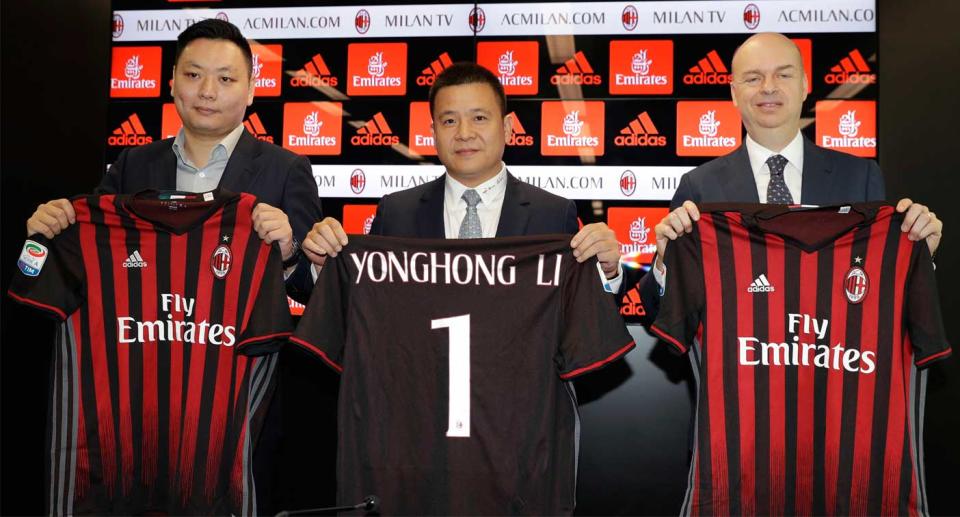Can AC Milan's new Chinese-American ownership turn it into a world power again?

If you’re a soccer romantic, a reading of AC Milan’s recent seasons makes for a sad story.
You’ll recall, after all, a time not so long past when the Italian club was a swaggering colossus. A side that won the old European Cup in 1988 and 1989 – as the last back-to-back European champions – before reaching the final of that tournament’s successor, the Champions League, three years in a row from 1993 through 1995, albeit only winning it in 1994. In 2003, it won it again. In 2005, it lost the final to a miraculous Liverpool comeback. And in 2007, it lifted the club game’s biggest trophy a seventh and last time.
Only Real Madrid, with 11, has more European titles.
[ Follow FC Yahoo on social media: Twitter | Facebook | Tumblr ]
Milan has won Serie A 18 times, and in 1992, did so without losing a single game.
Yet the last three years, the club that was turned into a juggernaut by the controversial Italian media tycoon and politician Silvio Berlusconi has finished eighth, 10th and seventh. Presently, it sits in sixth in Italy’s top division as hated rivals Juventus cruise toward a sixth straight championship.
The glory days are long gone.
Berlusconi’s 31-year run ended on Thursday when, after many months of haggling and financial hiccups, he sold his 99.93 percent stake to a Chinese investor, Li Yonghong, who is backed by an American hedge fund, Elliott. It seemed, at several points, like the deal would never go through, after the Chinese consortium couldn’t come up with the money and collapsed, before Li found alternative financing stateside at the eleventh hour.
The club changed hands for 740 million euros, including debt. And it was probably overdue. It had been apparent for a decade or so that Berlusconi no longer had the financial might – or willingness – to spend the requisite millions to keep Milan at the summit of the game, the way he did for two decades from the mid-1980s. He wasn’t helped by the economic downturn in Europe, or indeed the slow decline of Serie A and its clubs’ pesky inability to monetize their legacies.
But with the right business model, a savvy transfer approach and a little luck, Italian clubs can still compete, as demonstrated by Juventus. If it consolidates its 3-0 first-leg lead over Barcelona in the Champions League quarterfinals, Juve will be just one round away from a second final in three years.
The question, then, isn’t whether Milan can ever reach the summit of the sport again. It’s how much money and time and patience it will take. Can the new ownership put the right people in charge? Will those people get the manager they need? And spot the requisite talent?
Which boils down to the question of whether Li has the financial wherewithal to make a revival happen. It’s concerning, at a minimum, that he had as much trouble raising the money just to buy the club as he did, completing his deal through a de facto payment plan of deposits, promissory notes and bank guarantees – which, in one case, were found to be forged.
It will take hundreds of millions more just to become competitive in Italy again, let alone in Europe. There is no conclusive evidence that Milan’s new owner has that kind of money, even though he has promised significant investment.
And if he does, can he recruit the talent in the front office to put a winning team on the field?
Milan might finally have a path forward. But it’s just as likely that it will wind up treading water. Or worse.
Leander Schaerlaeckens is a soccer columnist for Yahoo Sports. Follow him on Twitter @LeanderAlphabet.

 Yahoo Sports
Yahoo Sports 

